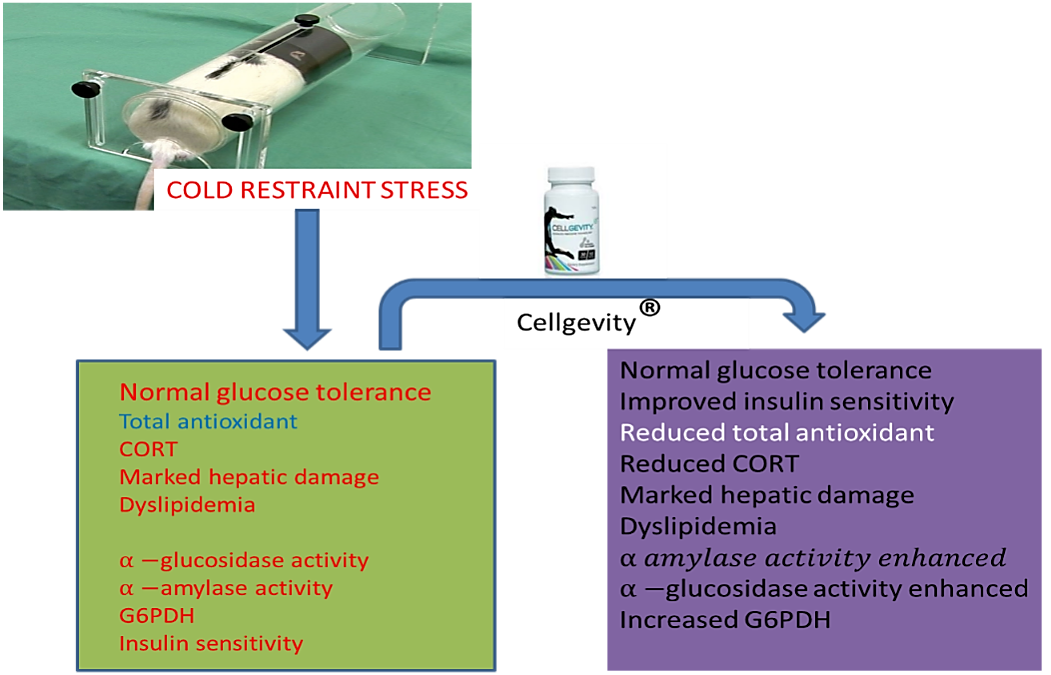Beneficial effect of Cellgevity® on metabolic indices, lipid profile, and antioxidant enzymes in cold-restraint stress rat model
DOI:
https://doi.org/10.31989/dsn.v2i10.1223Abstract
Background: Stress is a state of imbalance homeostatic environment caused by a psychological, environmental, or physiologic stressor. Stress is a common risk factor that is involved in the etiopathogenesis of diverse disorders. Moreover, stress hormones have an immediate negative impact on glycemic management.
Purpose of Study: The aim of our study is to investigate the glucometabolic potentialof Cellgevity® under stress conditions in male Sprague-Dawley rats. We employed cold restraint stress to effectively induce a physically and psychologically stressed condition.
Methods: Twenty-four (24) male Sprague-Dawley rats (207±20g) were divided into four groups at random: No stress Placebo (NSP), no stress cellgevity (NSCG), stress placebo (STP), stress cell cellgevity (STCG). The restraint (immobilization) stress was performed 2hr daily in the morning using a cylindrical cage (8:00 h± 10:00 h.), and the cold stress was performed for 2 hr in the afternoon (16:00 h± 18:00 h). The enzyme-linked immunosorbent assay was used to assess the circulating insulin and corticosterone levels. The glucose tolerance test (GTT) and insulin tolerance test (ITT), as well as the expression of G6PDH, alpha-amylase, and alpha-glucosidase enzymes were evaluated for glucose metabolism. Biochemical parameters such as Lipid profile, liver enzymes, and oxidative stress parameters were also determined.
Results: The STP rats had increased oxidative stress levels, elevated corticosterone levels, insulin resistance, dyslipidemia, and oxidative liver damage. Furthermore, cold restraint stress improved insulin levels but had no effect on glucose tolerance. However, Cellgevity® mitigates cold restraint stress-induced oxidative damage by causing reduction in corticosterone levels, modulating serum oxidative stress markers as well as metabolic indices.

Keywords:Cold-restraint Stress, Glucose Tolerance, Insulin Sensitivity, Corticosterone, oxidative stress.
Downloads
Published
Issue
Section
License
Any manuscripts or substantial parts of it, submitted to the journal must not be under consideration by or previously published in any other journal or citable form. Authors are required to ensure that no material submitted as part of a manuscript infringes existing copyrights or the rights of a third party. In submitting one's article in any form, the author has assigned the FFC publishing rights and has agreed to an automatic transfer of the copyright to the publisher. This is so that the FFC may create print option journals, for example, at the FFC’s discretion. If the author wishes to distribute their works by means outside of the FFC, for example within their community, they will have to place a request.
Correspondence concerning articles published in Functional Foods in Health and Disease is encouraged. While derivative works (adaptations, extensions on the current work, etc.) are allowed, distribution of the modified material is not allowed without permission from the FFC.